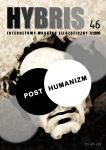MIGUELA DE UNAMUNA CZŁOWIEK Z KRWI I KOŚCI - JEDNOSTKOWY HUMANIZM W MYŚLI HISZPAŃSKIEJ PRZEŁOMU XIX I XX WIEKU
MIGUEL DE UNAMUNO,S MAN OF FLESH AND BLOOD - INDIVIDUAL HUMANISM IN SPANISH THOUGHT AT THE TURN OF THE 19TH AND 20TH CENTURIES
Author(s): Paulina FrankiewiczSubject(s): Recent History (1900 till today), Existentialism, 19th Century
Published by: Wydawnictwo Uniwersytetu Łódzkiego
Keywords: Miguel de Unamuno; The Man of Flesh and Bone; The Tragic Sense of Life; humanism; Spanish existentialism; Spanish philosophy;
Summary/Abstract: “The man of flesh and bone; the man who is born, suffers, and dies - above all, who dies; the man who eats and drinks and plays and sleeps and thinks and wills; the man who is seen and heard; the brother, the real brother”. With these words, Miguel de Unamuno (1864-1936) opens a philosophical treatise entitled The Tragic Sense of Life. By rejecting the abstract constructs hiding under the terms "humanity" and "what is human", the Spanish philosopher turns to a specific man, a man of flesh and blood (spanish: el hombre de carne y hueso). This man, aware of his individuality, whose philosophy derives from the experience of the title sense of the tragedy of life should be - according to Unamuno - not only the subject, but also the subject of philosophical reflection. As the indigenously human author of Mist, he recognizes the tear of man between the inevitable finitude and the desire for immortality (eternal life). Therefore, the only real problem of philosophy is the awareness of one's own and universal finitude. Unamuno's individual humanism focuses on three problems: questioning the meaning of the existence of death, the irrationality of human nature and the problem of (non)existence of God.
Journal: Internetowy Magazyn Filozoficzny HYBRIS
- Issue Year: 2019
- Issue No: 46
- Page Range: 173-191
- Page Count: 19
- Language: Polish

